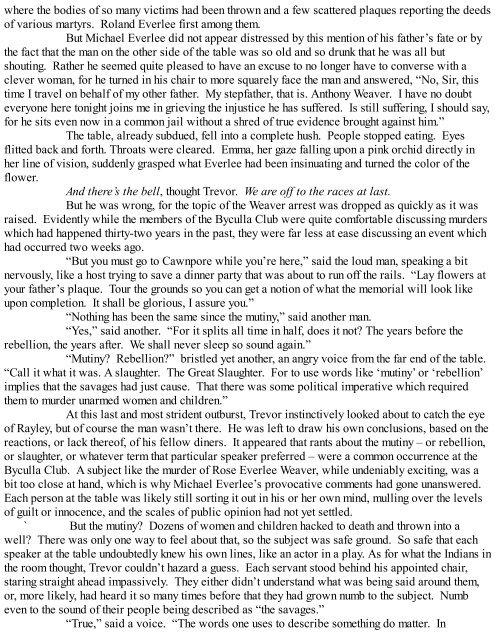Create successful ePaper yourself
Turn your PDF publications into a flip-book with our unique Google optimized e-Paper software.
where the bodies of so many victims had been thrown and a few scattered plaques reporting the deeds<br />
of various martyrs. Roland Everlee first among them.<br />
But Michael Everlee did not appear distressed by this mention of his father’s fate or by<br />
the fact that the man on the other side of the table was so old and so drunk that he was all but<br />
shouting. Rather he seemed quite pleased to have an excuse to no longer have to converse with a<br />
clever woman, for he turned in his chair to more squarely face the man and answered, “No, Sir, this<br />
time I travel on behalf of my other father. My stepfather, that is. Anthony Weaver. I have no doubt<br />
everyone here tonight joins me in grieving the injustice he has suffered. Is still suffering, I should say,<br />
for he sits even now in a common jail without a shred of true evidence brought against him.”<br />
The table, already subdued, fell into a complete hush. People stopped eating. Eyes<br />
flitted back and forth. Throats were cleared. Emma, her gaze falling upon a pink orchid directly in<br />
her line of vision, suddenly grasped what Everlee had been insinuating and turned the color of the<br />
flower.<br />
And there’s the bell, thought Trevor. We are off to the races at last.<br />
But he was wrong, for the topic of the Weaver arrest was dropped as quickly as it was<br />
raised. Evidently while the members of the Byculla Club were quite comfortable discussing murders<br />
which had happened thirty-two years in the past, they were far less at ease discussing an event which<br />
had occurred two weeks ago.<br />
“But you must go to Cawnpore while you’re here,” said the loud man, speaking a bit<br />
nervously, like a host trying to save a dinner party that was about to run off the rails. “Lay flowers at<br />
your father’s plaque. Tour the grounds so you can get a notion of what the memorial will look like<br />
upon completion. It shall be glorious, I assure you.”<br />
“Nothing has been the same since the mutiny,” said another man.<br />
“Yes,” said another. “For it splits all time in half, does it not? The years before the<br />
rebellion, the years after. We shall never sleep so sound again.”<br />
“Mutiny? Rebellion?” bristled yet another, an angry voice from the far end of the table.<br />
“Call it what it was. A slaughter. The Great Slaughter. For to use words like ‘mutiny’ or ‘rebellion’<br />
implies that the savages had just cause. That there was some political imperative which required<br />
them to murder unarmed women and children.”<br />
At this last and most strident outburst, Trevor instinctively looked about to catch the eye<br />
of Rayley, but of course the man wasn’t there. He was left to draw his own conclusions, based on the<br />
reactions, or lack thereof, of his fellow diners. It appeared that rants about the mutiny – or rebellion,<br />
or slaughter, or whatever term that particular speaker preferred – were a common occurrence at the<br />
Byculla Club. A subject like the murder of Rose Everlee Weaver, while undeniably exciting, was a<br />
bit too close at hand, which is why Michael Everlee’s provocative comments had gone unanswered.<br />
Each person at the table was likely still sorting it out in his or her own mind, mulling over the levels<br />
of guilt or innocence, and the scales of public opinion had not yet settled.<br />
` But the mutiny? Dozens of women and children hacked to death and thrown into a<br />
well? There was only one way to feel about that, so the subject was safe ground. So safe that each<br />
speaker at the table undoubtedly knew his own lines, like an actor in a play. As for what the Indians in<br />
the room thought, Trevor couldn’t hazard a guess. Each servant stood behind his appointed chair,<br />
staring straight ahead impassively. They either didn’t understand what was being said around them,<br />
or, more likely, had heard it so many times before that they had grown numb to the subject. Numb<br />
even to the sound of their people being described as “the savages.”<br />
“True,” said a voice. “The words one uses to describe something do matter. In
















